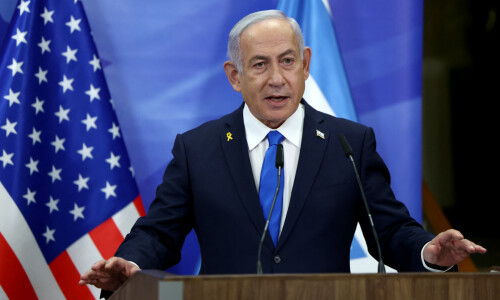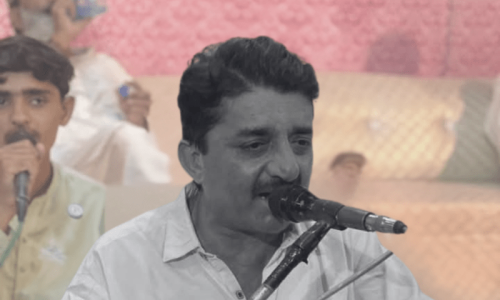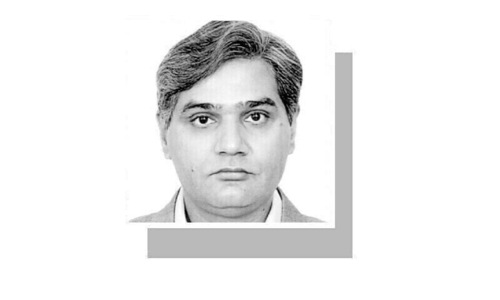
Recently Rahat Fateh Ali Khan played the arena in my home city of Leeds — four hours of liquid gold vocalisation. I was dazzled by the burnished fretwork of Rahat’s chalat phirat [musical improvisation] as well as the discipline and transcendent tones of his humnawaa [backing singers].
A few years before, I saw some other nephews of the late maestro Nusrat Fateh Ali Khan — the Rizwan-Muazzam Qawwali Group — play a much smaller venue in Newcastle. Despite Rahat’s more mainstream appeal, as compared to Rizwan-Muazzam Qawwali’s emphasis on tradition and authenticity, both gigs reminded me of the unshakeable connection between spirituality and the human voice.
At Rahat’s recent recital, I also recollected seeing the pop star Prince in another sold-out show at the same stadium. Though it was not long before he died, the Minnesotan artist had been full of energy and joy. At one point he deliberated about which tune to play next, exclaiming, “I’ve got so many hit songs, I don’t know how to choose.” Rahat, too, has all the hits: as when one is offered a box of mithaai, selection is difficult. He sang with consummate stamina for four hours and still missed one of my favourite numbers, ‘Bol Na Halke Halke’.
The qawwali tradition, although typically viewed as an Islamic (Sufi) musical form, came to maturity in the encounter between Muslims and Hindus in northern India before and during Mughal rule. There were currents of influence and exchange between the two religions’ music — evidenced by the fact that the musician-saints Amir Khusro and Kabir are venerated by many in both religious groups.
Nusrat Fateh Ali Khan was the scion of a long line of musicians hailing from Faisalabad and, before Partition, Jalandhar in east Punjab. He was uncle to the harmonious brothers Rizwan and Muazzam, as well as their cousin Rahat. Nusrat was renowned for his passionately controlled singing voice until and beyond his untimely death in 1997.
The great qawwal’s work indicates that this form of music has also been affected by the colonial encounter between Europeans and the Indian subcontinent. In the post-independence era, Nusrat became one of the most influential proponents of ‘world music’. He recorded Hollywood soundtracks — most famously for the 1995 film Dead Man Walking — and worked closely with Peter Gabriel. The Genesis singer has repeatedly named the Pakistani vocalist’s 1985 set at Gabriel’s WOMAD Festival in Essex as his favourite ever in the festival’s 37-year history. Starting with ‘Allah Hu’, Nusrat’s four songs stretched across an incantatory hour of music. Gabriel’s United Kingdom-based world music label Real World released the remastered live album this July, suggesting that one of the centres of qawwali music today is the former imperial capital. Nusrat’s iconic song ‘Mast Mast’ had earlier been remixed by the Bristol-based band Massive Attack. Fronted by black British artist Tricky, the trip-hop band made the song a surprise dance hit in 1990.
A writer who explores the hybridity embodied by this virtuoso is the British Pakistani novelist Nadeem Aslam. In his 2004 masterpiece Maps for Lost Lovers, which is mostly set in the late 1990s, Aslam returns again and again to Nusrat’s music as a symbol for ecstatic Sufic love. I have written about the extraordinarily sensory aspects of Aslam’s depiction of Nusrat’s spiritual soaring in my monograph Making Sense of Contemporary British Muslim Novels.
Julien Columeau is a French author who came to Pakistan in the early 2000s and never left. Columeau writes much of his highly-regarded fiction in Urdu, and his most recent collection in that language — Chowrangi Kahaniyan — features the short story ‘Kamran Ali Qawwal’. Its titular narrator, Kamran Ali Khan Qawwal, is based on Rahat. The story focuses on Kamran’s relationship with his uncle Muzaffar Ali Khan, who is a fictionalisation of Nusrat. Readers are told that Muzaffar made the soundtrack for a film in which a man is sentenced to death for rape and murder, a clear allusion to Dead Man Walking.
Kamran is at a hotel in Filmpur, India, where he is staying to perform his first triumphant comeback concert after a period when his voice was weak. He hears gunshots in the lobby and realises that his plush accommodation is under siege by terrorists. To escape violence not unlike Mumbai’s 2008 Taj Mahal Hotel terror attack, Kamran conceals himself in his room’s closet. From that hiding place he listens to the firing and looks back on his life, narrating the story of how he was involved in his uncle Muzaffar’s death.
Readers are presented with a series of flashbacks about the dysfunctional relationship between Muzaffar and his brother (Kamran’s father) Waqar Ali Khan. Muzaffar’s cruelty to, and belittling of, Waqar had made Kamran furiously angry. His father was a better qawwal than Muzaffar, but not so interested in showmanship. Because Muzaffar performed so well, he garnered great popularity, outshining his brother. After Waqar’s slow death from depression at years of humiliation, Kamran resolved to take revenge on his celebrated qawwal uncle. Before Waqar died, this brother had been responsible for the life-saving medicine for Muzaffar, a heart patient. Now Kamran is entrusted with the drugs and he bides his time. Soon Muzaffar suffers a heart attack on a beach at Reunion Island. Kamran claims he doesn’t have the medication and refuses to help. This leads to Muzaffar suffering an over-indulgent death reminiscent of Nusrat’s and Elvis Presley’s from musical history.
The story’s second half is about how Kamran’s star ascends in the qawwali firmament, but he feels guilty about the murder. There are shades of Macbeth as he finds himself haunted by the shadowy figure of a forlorn man whom he knows to be Muzzafar. Horrified and tormented, Kamran’s voice weakens. It takes him years to recover his singing prowess through making amends to his uncle and God by becoming intensely spiritual. Now, facing his own death at the hands of terrorists, he makes a full confession to the reader.
Because I don’t read Urdu, I am indebted to the scholar and translator Sana Riaz for this rendition. We hope to bring Columeau’s full story to an Anglophone audience in due course. Its epic themes, bold and irreverent play with history and direct mode of address are especially striking. Listening to Rahat Fateh Ali Khan’s effortless four-hour set, the story’s portrayal of familial complexities around rivalry and vengeance was uppermost in my mind.
The columnist teaches global literature at the University of York and is the author of three books, including
Rivers of Ink: Selected Essays
Published in Dawn, Books & Authors, December 1st, 2019


















































Dear visitor, the comments section is undergoing an overhaul and will return soon.